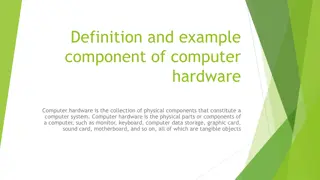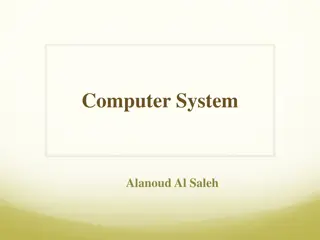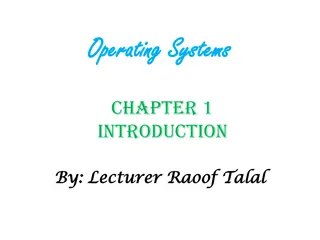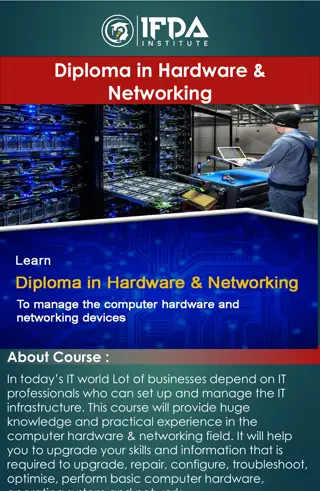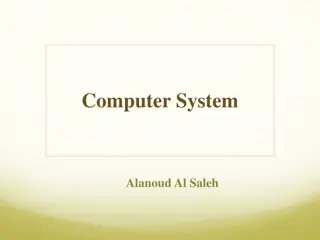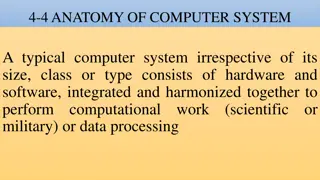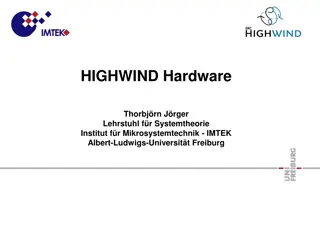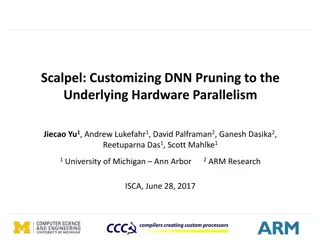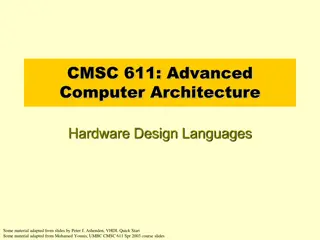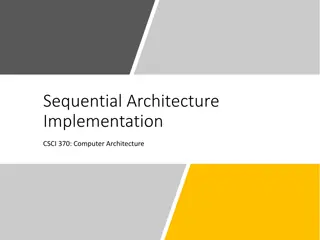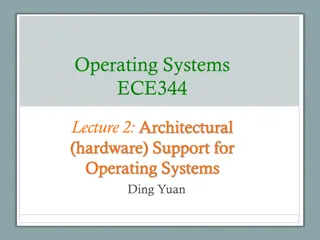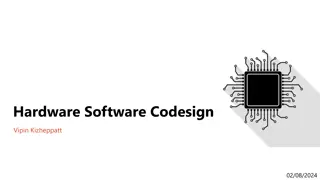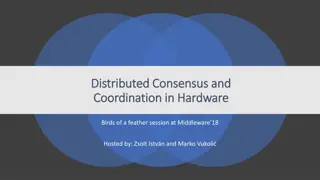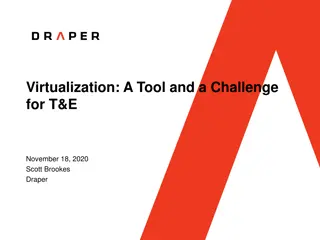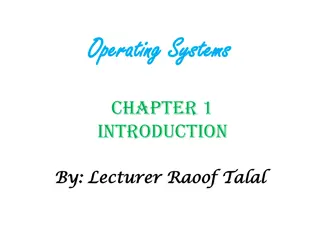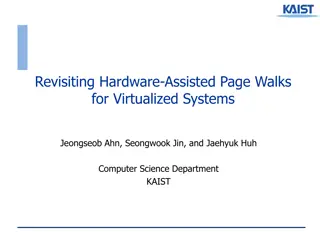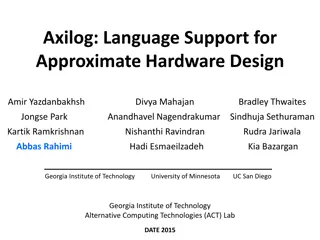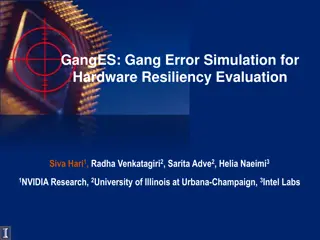Understanding Computer Organization and Architecture
A computer system is a programmable digital electronics device that processes data as per program instructions to provide meaningful output. It comprises hardware and software components, with hardware being the physical parts and software essential for driving the hardware. Computer organization fo
14 views • 71 slides
Actions Emanating from the Evaluation of the Governance Reform
The evaluation of the governance reform within the WMO aimed to assess its alignment with strategic objectives, effectiveness in responding to societal needs, coordination efficiency, decision-making process, agility, and more. Evaluation criteria included relevance, design validity, effectiveness,
1 views • 13 slides
Addressing Monitoring Challenges in Hardware Offloading
Exploring the complexities of offloading monitoring tasks in hardware, this content delves into the limitations of current methods such as move_pages and IBS/PEBs-based monitoring. It highlights the need for efficient tracking mechanisms like IDLE-bit and proposes innovative solutions like Transpare
3 views • 17 slides
Hold Down and Release Mechanism Hardware Simulator for Ground Deployment Testing
The project involves developing a hardware simulator for testing a Hold Down and Release Mechanism used in Mars Sample Return missions. The simulator aims to replicate the functionality of expensive flight hardware at a lower cost and with reduced lead time. Key requirements include precise activati
3 views • 8 slides
Stainless Steel D Rings, O Rings & Weldable D Ring Hardware
Explore our collection of high-quality stainless steel D rings, weldable D rings, and versatile O rings. Ideal for various hardware applications, our rings ensure durability and reliability. Shop now at Buckles International for premium hardware rings.
0 views • 9 slides
Universal Evaluation Framework: Simplifying Evaluation Processes
This session introduces the Universal Evaluation Framework (UEF) developed for evaluating QAA Scotland Enhancement Themes. Participants learn key evaluation questions, evidence capture, and the Theory of Change to enhance evaluation confidence. The QAA Scotland Evaluation Odyssey details historical
2 views • 14 slides
Overview of Computer Hardware Components and Software Functions
Computer hardware components such as monitor, CPU, mouse, and projector are essential physical parts of a computer system, while software includes intangible programs like operating systems and utility software. Hardware components perform tasks like displaying data, processing information, and prin
8 views • 9 slides
Implementing Blind Evaluation Pilot in HORIZON EUROPE: Key Facts and Process
HORIZON EUROPE is conducting a pilot on Blind Evaluation in the 2023-2024 work program to address biases in the research and innovation evaluation process. The pilot aims to assess the feasibility of blind evaluations in ensuring fairness and mitigating potential biases towards well-known organizati
9 views • 9 slides
Exploring Developmental Evaluation for Better Decision-Making
Delve into the realm of developmental evaluation, focusing on its purpose, principles, and application in practice. Understand how developmental evaluation emphasizes real-time data collection for informed decision-making in complex systems. Learn about key principles such as developmental purpose,
0 views • 25 slides
Understanding Computer Systems: Components and Organization
Computer systems are high-speed electronic machines that process data and instructions through hardware and software components. The elements include hardware, software, and users, with binary systems using bits and bytes to represent data. The organization of a computer involves input, CPU, memory,
2 views • 21 slides
Understanding Operating Systems: Introduction and Functions
An operating system plays a crucial role in managing computer hardware and facilitating user-computer interactions. It serves as an intermediary between users and hardware components, ensuring efficient resource allocation and control. The operating system coordinates the use of hardware resources b
5 views • 16 slides
Diploma in Hardware & Networking: Upgrade Your IT Skills
This course provides comprehensive knowledge and practical experience in computer hardware and networking, essential for managing IT infrastructure. Gain expertise in PC hardware maintenance, customer and networking support, and more to pursue a career as a Hardware and Network Engineer. Learn to as
1 views • 8 slides
Understanding Computer Systems and Components
Computer systems are high-speed electronic machines that process data and instructions to solve problems. They consist of hardware and software elements, with input and output devices for interaction. Key concepts include binary system, byte measurement units, hardware organization, and input hardwa
1 views • 21 slides
Efficient Data Race Detection Using Transactional Memory
This presentation discusses data race detection in multithreaded programs, exploring the impact of race conditions and the state-of-the-art dynamic data race detector solutions. It introduces a hybrid software and hardware approach leveraging Hardware Transactional Memory for lightweight data race d
1 views • 31 slides
Enhancing Evaluation Capabilities in Mongolia for Agenda 2030
The Mongolian Evaluation Network in collaboration with UNDP is working to integrate the 2030 Agenda into national strategies and plans, establish institutional coordination mechanisms, align budgets, and enhance data monitoring systems. Key stakeholders including government agencies, NGOs, and inter
0 views • 9 slides
Anatomy of a Computer System: Hardware Components and Functions
A typical computer system consists of hardware and software working together to perform various computational tasks. The hardware components include the central processing unit (CPU), input/output devices, storage units, and the motherboard. The CPU acts as the main brain of the computer, performing
6 views • 6 slides
Understanding Computer Hardware Components
Computer hardware encompasses the physical components of a computer system that can be touched and felt, such as the motherboard, CPU, RAM, and storage devices like HDD and SSD. Without hardware, essential software cannot run efficiently. This lesson explores the definition, importance, and various
1 views • 6 slides
Understanding the Basics of BIOS in Computers
BIOS (Basic Input Output System) is a crucial piece of software that serves as an intermediary between a computer's hardware and the operating system. It plays a fundamental role in facilitating communication and interaction between the hardware components and software applications. This article del
1 views • 26 slides
Understanding Evaluation in Education
Evaluation in education is a comprehensive term that encompasses measurement, testing, and qualitative examination of student behavior. It involves both quantitative and qualitative descriptions, along with value judgments. Differentiating from mere measurement, evaluation provides a deeper analysis
0 views • 28 slides
Sustainable Evaluation Systems Workshop Summary
Workshop on Sustainable Evaluation Systems by Stephen Porter at the NEC Conference focused on defining evaluation systems, addressing their failures, and emphasizing the importance of quality, use, and networks in achieving sustainability. Participants engaged in activities such as bingo card introd
0 views • 38 slides
HIGHWIND Hardware: Team and Responsibilities Overview
Explore the team and responsibilities behind the HIGHWIND hardware project, involving airplane components, sensors, actuators, communication interfaces, control software, and visualization. Meet the dedicated members working on flight software and hardware, all focused on enhancing communication, sa
1 views • 31 slides
Optimizing DNN Pruning for Hardware Efficiency
Customizing deep neural network (DNN) pruning to maximize hardware parallelism can significantly reduce storage and computation costs. Techniques such as weight pruning, node pruning, and utilizing specific hardware types like GPUs are explored to enhance performance. However, drawbacks like increas
0 views • 27 slides
Impact and Evaluation Toolkit for Churches and Christian Charities
This toolkit aims to equip churches and Christian charities engaged in small-scale social action projects to think about impact, measure impact, choose data tools, reflect on evaluation data, and use it effectively. It covers principles of evaluation, setting objectives, selecting indicators, storyt
0 views • 34 slides
Overview of Fly and Trajectory Scans in Data Acquisition
Fly and trajectory scans in data acquisition involve software and hardware options for acquiring data while positioners move at constant speeds. Software fly scans enable periodic data acquisition triggered by software, while hardware fly scans rely on pulses from positioners. Hardware fly choices a
0 views • 14 slides
Overview of Monitoring and Evaluation in the GEF
The Evaluation in the GEF and Training Module focuses on promoting accountability and learning within the Global Environment Facility (GEF) through monitoring and evaluation activities. The GEF Independent Evaluation Office plays a crucial role in assessing results, effectiveness, and performance of
0 views • 25 slides
Developing an Evaluation Work Plan for Effective Program Assessment
This presentation by Amy D. Andrade from San Jose State University focuses on developing an Evaluation Work Plan to identify responsibilities and timelines. It covers topics such as Evaluation Coaching Support, Webinar Outlines, Logic Model, Inputs-Outputs-Outcomes, Two Approaches to Evaluation, Pro
0 views • 29 slides
Understanding Hardware Design Languages in Advanced Computer Architecture
This material covers topics like behavioral correctness, timing simulations, domains, and levels of modeling in hardware design languages. It discusses functional and structural modeling, as well as the use of simulators to analyze and verify system behavior. Hardware Design Languages, behavioral de
0 views • 38 slides
Evaluation Synthesis in Changing Contexts: Enhancing Knowledge for Development Effectiveness
Evaluation synthesis is crucial for promoting learning, reflection, and decision-making in development work. This process involves bringing together diverse knowledge sources to generate strategic insights and facilitate wider use of evaluation findings. The Independent Office of Evaluation of IFAD
0 views • 20 slides
Understanding Y86-64 Instruction Set and Hardware Control Language
Delve into the Y86-64 instruction set architecture, exploring sequential architecture implementations for computer architecture. Uncover the various instruction sets and their functionalities, such as halt, nop, call, ret, and more. Additionally, discover the building blocks of hardware, including A
0 views • 51 slides
Evaluation of FME Zero Emission Neighbourhoods in Smart Cities
The mid-term evaluation process of FME Zero Emission Neighbourhoods in Smart Cities involves self-evaluation, partner evaluation, and panel evaluation. The procedure includes scientific review, evaluation by scholars, and innovation assessment. Key documents like self-reports, progress reports, and
1 views • 20 slides
Overview of Regular Evaluation 2017 Findings in Estonia
In the Regular Evaluation 2017, efforts were made to maximize the benefits of evaluation outcomes for various stakeholders in Estonia such as the state, society, and institutions. The evaluation focused on a range of actions including preparing legislation, finding experts, creating self-report form
0 views • 6 slides
Architectural Hardware Support for Operating Systems in ECE344 Lecture
The lecture discusses the importance of hardware support in operating systems, emphasizing the management of hardware resources and providing a clear interface to programs. It explores the fundamental relationship between operating system functionality and hardware, highlighting how hardware support
0 views • 53 slides
Hardware-Software Codesign Course Details
This comprehensive hardware-software codesign course presented by Vipin Kizheppatt covers various aspects such as course management, objectives, prerequisites, evaluation components, software fundamentals, and practical applications. The course aims to equip participants with the skills to design an
0 views • 14 slides
Comprehensive Guide to Training Evaluation Methods
This detailed guide covers the aim of evaluation, evaluation methods, techniques of evaluation, types of evaluation (formative, process, outcome, impact), and the significance of formative and process evaluation in assessing training effectiveness. Learn about the key principles and practices involv
0 views • 45 slides
Distributed Consensus and Coordination in Hardware Birds of a Feather Session
Specialists in distributed consensus and hardware coordination gathered at Middleware 18 for a session hosted by Zsolt István and Marko Vukoli. The session covered topics such as specialized hardware, programmable switches and NICs, P4 language for expressing forwarding rules, and deployment exampl
0 views • 33 slides
Understanding Virtualization: Hardware Abstraction and Hypervisor Concepts
Dive into the world of virtualization with a focus on hardware abstraction and hypervisor technology. Explore the definitions and examples of hardware virtualization, hypervisors, and hardware abstraction, shedding light on how they enable multiple operating systems to coexist on a single physical m
0 views • 21 slides
Understanding Operating Systems: An Introduction and Overview
An operating system is a crucial program that manages computer hardware and serves as an intermediary between users and hardware. This chapter explores the role of operating systems in a computer system, covering components like hardware, application programs, and users. It delves into how operating
0 views • 16 slides
Hardware-Assisted Page Walks for Virtualized Systems
Virtualization in cloud computing and server consolidation relies on hardware-assisted page walks for address translation in virtualized systems. This involves two-level address translations to ensure isolated address spaces for each virtual machine, utilizing multi-level page tables to manage memor
0 views • 32 slides
Approximate Computing in Hardware Design: A Comprehensive Overview
Explore the groundbreaking concepts of approximate computing in hardware design, which involves embracing errors to enhance resource efficiency and performance. Delve into topics such as avoiding worst-case design, criteria for approximate HDL, safety in hardware, and relaxing accuracy requirements
0 views • 31 slides
GangES: Gang Error Simulation for Hardware Resiliency Evaluation
GangES introduces a new error simulator to expedite full error simulations for assessing hardware resiliency. By reducing the number of simulations and leveraging program structure, it achieves significant time savings over existing methods. Additionally, the study explores the feasibility of progra
0 views • 38 slides






